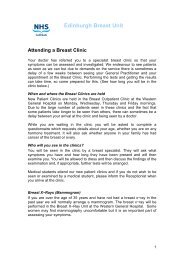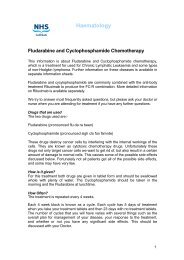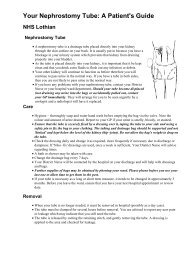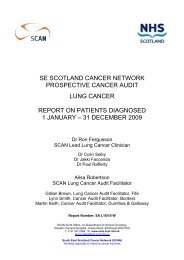Superior Vena Cava (SVC) Stents - SCAN
Superior Vena Cava (SVC) Stents - SCAN
Superior Vena Cava (SVC) Stents - SCAN
Create successful ePaper yourself
Turn your PDF publications into a flip-book with our unique Google optimized e-Paper software.
Q. What happens after my <strong>SVC</strong> stent procedure?<br />
A. You will return from the radiology department to your ward bed. If your ward was at a different hospital<br />
you will remain at the RIE or QMH for a period of observation (usually an hour or two). Sometimes it may be<br />
more practical to stay overnight. The doctors or nurses will tell you when you can eat and how long you have<br />
to stay in bed.<br />
There may be swelling or bruising in the groin or neck where the IV tube was placed. This will go away in a<br />
few days to a week and generally requires no treatment.<br />
Q. How quickly does the <strong>SVC</strong> stent work?<br />
A. If you have swelling of the face and neck this should get better in a few days. Arm swelling may take<br />
longer to get better. Some symptoms like headache may go away immediately.<br />
Q. What are the risks of the <strong>SVC</strong> stent procedure?<br />
A. Any procedure involving blood vessels has a risk of bleeding. The risk of serious bleeding occurs is about<br />
1%. Occasionally the stent can block later causing the symptoms to return. Usually this is treated by inserting<br />
another <strong>SVC</strong> stent.<br />
Q. Are there alternatives to <strong>SVC</strong> stenting?<br />
A. The blockage of the blood vessels in the upper chest is sometimes best treated with an <strong>SVC</strong> stent and<br />
sometimes best treated with radiotherapy or chemotherapy. (Radiotherapy is treatment with x−rays and<br />
chemotherapy is treatment with drugs.)<br />
Q. What are the benefits of <strong>SVC</strong> stenting?<br />
A. Your symptoms may improve more quickly than with other treatments and <strong>SVC</strong> stenting has fewer side<br />
effects than radiotherapy and chemotherapy. However your doctor may recommend further treatment with<br />
radiotherapy or chemotherapy in order to treat the growth once the blockage has been relieved by the stent.
















